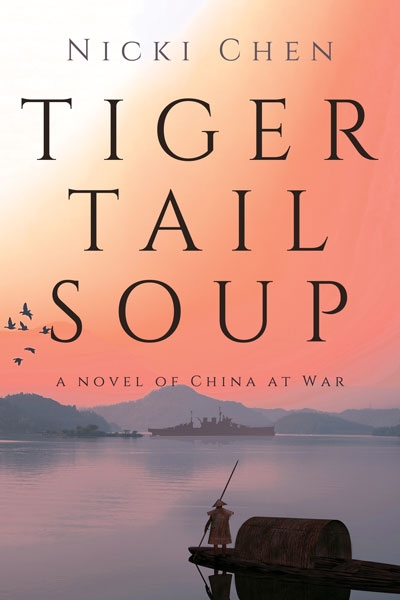The Best-Selling Author Didn’t Speak English.
 I was brushing my teeth, the radio providing companionable background chatter, when a woman’s voice caught my attention. She sounded like an author reading from her book. Something about arriving in America from China in 1984 and being scared because she didn’t have any money and didn’t speak English. She was twenty-seven then, she said. And I was thinking, It’s so hard to learn a language when you’re that old.
I was brushing my teeth, the radio providing companionable background chatter, when a woman’s voice caught my attention. She sounded like an author reading from her book. Something about arriving in America from China in 1984 and being scared because she didn’t have any money and didn’t speak English. She was twenty-seven then, she said. And I was thinking, It’s so hard to learn a language when you’re that old.
Tightening my lips around the toothpaste, I turned off the water and walked closer to the clock radio. The woman had asked a friend in China to fill out her application for the Art Institute of Chicago. When she arrived in the United States, she said, she improved her English by watching Sesame Street.
I ran back to the bathroom and rinsed my mouth. What was the author’s name? What had she written? I hurried back to the radio, grabbing a pen and tablet on the way.
“Thank you, Anchee Min,” the NPR reporter said after naming the book.
 Wait! I thought. I know Anchee Min. I have three of her books on my shelf. She’s been writing for maybe twenty years. And you mean to say that in 1984 she didn’t speak English? How in the world could that be?
Wait! I thought. I know Anchee Min. I have three of her books on my shelf. She’s been writing for maybe twenty years. And you mean to say that in 1984 she didn’t speak English? How in the world could that be?
Anchee Min’s memoir: The Cooked Seed.
Determined to find out how Ms. Min became a best-selling author and learned English at the same time, I ordered her new book on Amazon: The Cooked Seed: a memoir. Since I’m a slow reader and the only time I read books is while I’m eating breakfast, I am still, as of this writing, only two-thirds of the way through her memoir. But I already think I have some answers:
1. Anchee Min must be an extremely hard worker. While attending the art institute, she worked at multiple jobs, up to five at a time.
2. Her first husband saw her creative talent and encouraged her.
3. She realized that, although her English was poor, she had interesting material to write about.
4. And, she was desperate to get a green card. She figured that publishing something would give her a better chance.
For those of us who struggle to write well in our native language, Anchee Min’s is an awe-inspiring story. She wrote her first book in Chinese and translated it word by painful word into English. She wrote everything by hand; then she typed it up on an old-fashioned typewriter that she’d bought for six dollars at a flea market. And when an agent, Sandra Dijkstra, finally called her, she couldn’t understand most of what Ms. Dijkstra was saying.
A fantastic story!
Since publishing her first book, Red Azalea in 1994, Anchee Min has published seven more books, all of them worldwide bestsellers. Her other books include: Pearl of China, The Last Empress, Empress Orchid, Wild Ginger, Becoming Madame Mao, and Katherine.
Immigrants in my own family.
Maybe Anchee Min’s story of perseverance and success shouldn’t surprise me so much. I have immigrants in my family, and though none of them became famous or rich, they also did some pretty amazing things. My paternal grandparents, for example, had nothing when they came to Canada and then to the United States from Scotland and Ireland. My grandpa found jobs as a carpenter and sent money back to his family in the Orkney Islands. My grandma worked as a maid. And despite many troubles, they built a life for themselves and their five children.
Do you have some immigrant stories from your family? I’d love to hear them.




i was born and raised in this country
i have a college degree
and still, my “English” is pretty. . . p i t i f u l l …
in order to write a novel in my native tongue – i’ d have to team up with a wordsmith!
Hi Nicki,
This story is fascinating. I have Swiss colleagues, native German speakers, who write articles in English and it never ceases to amaze me. There are very few novelists who manage the crossover and even after 10 years in Switzerland I would never dream of writing in German or French. Daring to attempt it is one thing, putting the hard work in is another. Thank you for the introduction to Anchee Min – and the inspiration.
Happy New Year, by the way!
Clare
I agree with you, Clare, Anchee Min is a real inspiration. Writing a novel in a foreign language is inconceivable to you and me, and yet, some amazing writers have pulled it off. Nabokov wrote in English, French, and Russian, but I think he was trilingual from an early age. Joseph Conrad grew up speaking Polish and French. He didn’t learn English until he was in his twenties, and yet he wrote most of his work in English. It’s said that his knowledge of other languages and literature made his work sound exotic and gave him an edge.
Happy New Year to you!
I lived in Israel for almost 9 years and my Hebrew never got better than pathetic. I’m always amazed and impressed by people who can master languages. Maybe even awestruck 🙂
Especially, Marilyn, people who can master a language in adulthood. My children studied at the International School in Manila, and time after time I saw young children who came to the school speaking no English and ended up speaking like a native. I remember one year when a Korean boy who couldn’t speak English the previous year won the sixth grade spelling bee. (He ended up at Harvard, if I remember right.)
What a narrative! Wonderful post – a reminder that effort and hard work are the determinants of a creative spirit. We are all emigrants in some way.
Your comment is thought-provoking. We often think of creativity as a characteristic some people are born with and others lack. But I agree. We come up with something “creative” when we make the decision to try and then put in the hard work.
You say we are all emigrants, and I suppose when we leave a comfortable situation behind and have to get used to something new, we are like people leaving our native land to settle in a new country. And life is continually plunging us into new situations–like it or not.
She must be very talented and dedicated when it comes to learning foreign languages. I admire her courage – trying to find a publisher at a time when she wasn’t fluent at speaking English yet.
“If nothing came of it,” Anchee Min said in her book, “my English would improve. It would help me land a job as an office receptionist.” She really had grit.
I love this post! Anchee Min has been one of my favorite authors ever since I read “Red Azalea” twenty years ago. I remember finding it at the public library in Hong Kong and was so amazed by her writing and her escape with the help of Joan Chen (who I once spotted shopping in San Francisco, but didn’t have the nerve to approach; I like to think I gave her the gift of privacy that day!). Anchee Min came to Chicago, which is where I’m from. But it wasn’t until I read “The Cooked Seed” that I realized how much she struggled in Chicago. Learning English and learning to write so beautifully in a second language is a huge deal. Her scary living conditions in Chicago are also to be admired!
When we read Anchee Min’s earlier novels, I don’t think we could have imagined all she went through to be able to write them. Most immigrants have family or friends or money to help them make the transition to a new country. Or they know the language. She had nothing. It’s amazing she survived, let alone succeeded so spectacularly.
Interesting article Nicki. You’ve inspired me to read Anchee Min’s books.
Anchee Min’s books are worth reading. Along with the story, you’ll learn a lot. Empress Orchid, which I read recently, describes in detail what it was like to be a lowly concubine fighting her way to the top in the emperor’s court.
All four of my grandparents emigrated. None of them ever learned English so I have a soft spot in my heart when I hear stories of immigrant communities that speak their native tongue. They all worked very hard, willing to do menial work or hard labor even though they had skilled jobs in their homeland. This seems to be a thread woven in the most successful stories. They work harder than those who were born here and they never take anything for granted. The transition from Chinese to English must be especially hard. The languages don’t even share an alphabet!
Trouble learning the language must be at or near the top of the list of problems that keep immigrants from getting jobs they are otherwise qualified for. I took a couple of classes in Chinese, and though I enjoyed studying it, I couldn’t imagine learning enough to be able to express myself the way I can in English. The two languages have nothing in common.
My grandmother and great aunt emigrated from Aberdeen Scotland ~ they used to summer in the Orkney Isles. 😀
My sister visited the Orkney Islands, and from the photos she brought back, it looks rather bleak–rocky and windblown, no trees that I could see. I’m glad to hear it had something to attract your grandmother and great aunt.